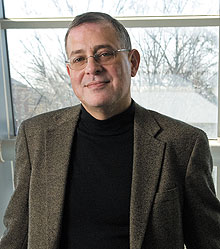  |
| HOME | THIS ISSUE | CALENDAR | GRANTS | BACK ISSUES | < BACK | NEXT > |
New CLAS dean skilled at solving problemsby Cindy Weiss - December 1, 2008
|
||||
| Jeremy Teitelbaum, new dean of the College of Liberal Arts and Sciences (CLAS), began his academic career as a mathematician and still signs his letters, “Dean and Professor of Mathematics.” What he likes best about being a dean is what he also does as a mathematician: problem solving. An affinity for solving problems with numbers is a plus for a new dean joining the University during a time of budget cuts and resource restrictions. “I didn’t expect this the first week, but it’s part of the deal,” he says, noting that the financial issues now on his agenda are being felt at universities around the country. When those issues recede, he would like to work on strengthening support for interdisciplinary research programs, adding to the diversity of the faculty, and finding ways to gain recognition for the College’s outstanding programs. “We have lots of really strong departments out there. I’d like to make them even better,” he says. With 23 departments, 600 faculty, and more than 12,000 students, CLAS covers more territory and oversees a wider range of academic areas than any other school or college at the University. At some point, every student at UConn, even those enrolled in other schools, takes classes in CLAS, the home of the sciences, humanities, and social sciences. Since he arrived at UConn in mid-August, Teitelbaum has attended faculty meetings in every CLAS department; met with heads of CLAS centers, graduate students, alumni, and friends of the College; and spoken to the Women in Math, Science, and Engineering group, which includes faculty from other schools as well as CLAS. He has worked with his four associate deans to reduce the budget and revise the College’s strategic plan to align with the University’s new academic plan. And he called a town meeting to take questions from faculty about the current year budget rescission, which poses particular challenges for a college with such broad responsibilities for teaching and research. Teitelbaum says developing close working relationships between departments and the dean’s office was a source of satisfaction in his previous job as senior associate dean of liberal arts and sciences at the University of Illinois at Chicago (UIC). At UIC, he developed a systematic budget review process for departments, created a Mathematical Sciences Learning Center, and worked to increase faculty diversity. A native of New York City who grew up in Denver, Colo., Teitelbaum earned a BA in mathematics summa cum laude from Carleton College, a small liberal arts institution in Minnesota, and a Ph.D. in mathematics from Harvard University, where his thesis adviser was number theorist John Tate.
Before joining UIC in 1990, he was on the faculty of the University of Michigan. He has been a Sloan Research Fellow and a National Science Foundation graduate and postdoctoral fellow, and has lectured and taught in China, Israel, and Germany. Last summer, before joining UConn, he gave lectures in Paris on p-adic analysis, a technique in the central area of pure mathematics known as Number Theory. “The ultimate goal of work in my field is to understand in detail the existence of whole number solutions to polynomial equations,” says Teitelbaum, “but it’s hard to explain exactly what I do in just a sentence or two.” Teitelbaum also has worked on problems related to cryptography, a subject that formed the basis of an honors seminar he taught at UIC. He came to UConn from an urban campus but was attracted to UConn by the rural life, the people that he met, and the quality of the University. “Some of the issues that people were struggling with were things I had some experience with – such as enrollment management, resource allocation,” he says. He and his wife, Mona, enjoy hiking and walking their dog in the woods. Teitelbaum is a flatpicking guitarist, playing bluegrass and folk music, and formerly was a member of the Oak Park Farmer’s Market Band in suburban Chicago. The Teitelbaums’ daughter is a sophomore at Williams College, and their son, who graduated from Northwestern University last spring, works as a paralegal in the Manhattan district attorney’s office. Mona Teitelbaum, who taught fourth grade in Oak Park, is teaching as a substitute in schools here. Teitelbaum says he is “passionate about the liberal arts,” which he sees as a good preparation for a future made uncertain by economic difficulties. When he was director of graduate studies at UIC several years ago, he recalls, everyone had to learn specialized computer-related skills, in response to the job demand created by the technology bubble. When it burst, many of them lost their jobs. “You have to be prepared for many different futures,” he cautions. “A liberal arts and sciences education can lay a foundation to build on for the rest of your life.” |
| ADVANCE HOME UCONN HOME |

